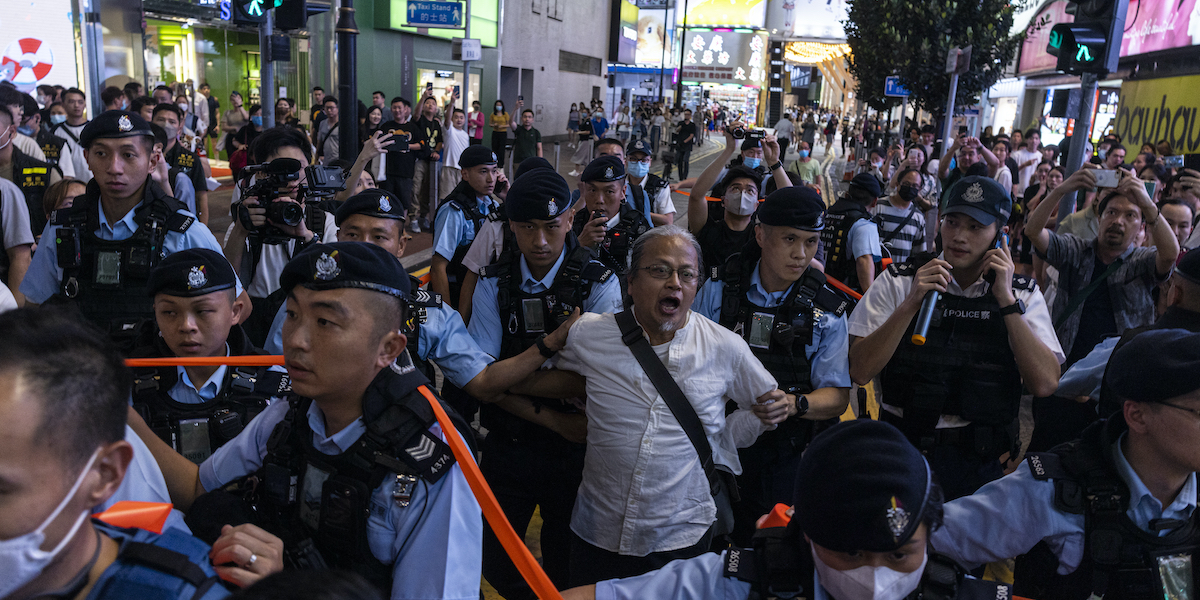Hong Kong police arrested eight people on Saturday, accusing them of rioting, violating public peace and carrying out acts with seditious intent. The allegations were released in an official statement without too many explanations, but the testimonies and precedents of recent years show how this type of arrests are part of a wider repression that aims to avoid any form of commemoration of the anniversary of the massacre of Tiananmen Square, which took place 34 years ago.
Hong Kong, a former British colony that has assumed the status of a Chinese special administrative region since 1997, was for a long time the only place in China where a major annual commemoration for the Tiananmen Square massacre was held: also by virtue of a particular freedom and autonomy on various issues which it enjoyed, and for which it was considered a kind of “frontier of democracy” in China. In recent years, however, the Chinese regime’s control over Hong Kong has increased enormously, despite great protests, and democracy and freedom have been progressively eroded until they are completely dismantled. Thus, demonstrations in Tiananmen Square have also been banned in Hong Kong since 2020, using the pandemic as a pretext as a reason.
For the first two years of the ban, in 2020 and 2021, demonstrations were still staged and there were many arrests of activists and demonstrators. Last year they weren’t held for the first time and this year the same is happening.
On June 4, 1989, many demonstrators who gathered in Tiananmen Square in Beijing to demand democratic reforms were killed by the country’s army on orders from the government of Deng Xiaoping. The protests in the streets had been going on since mid-April: they were organized by students, intellectuals and workers, and born following the death of the reformist communist leader Hu Yaobang. They reflected the concerns of part of the population about the rapid economic changes in the country, corruption and the lack of sufficient freedom of the press and of expression. After days of protests and hesitations by the government about how to deal with them, people’s army convoys entered Beijing during the night of June 3-4, and the demonstrations were finally put down by force. The army fired into the crowd with rifles and tanks, killing several hundred people (thousands by other estimates).
For decades, China has implemented a widespread repression of any form of protest regarding the event, avoiding the holding of demonstrations for the massacre and exceptionally pervasive censoring of any form of testimony or publication that could recall it, even on the internet.
At Victoria Park, a large public area in Hong Kong where the annual demonstrations for Tiananmen Square used to take place, this year a carnival fair lasting several days, including on June 4, was organized by some pro-Chinese groups.
Around the site of the event and in adjacent neighborhoods there was a massive deployment of police officers: journalists from AFP on site they said of seeing the police load several street performers into their vans, apparently for no reason. Another artist, however, Sanmu Chen, was also arrested near Victoria Park after repeatedly singing a chant that said “don’t forget June 4!” and “people of Hong Kong, do not be afraid of them”. Two other well-known activists, Lau Ka-yee and Kwan Chun-pong, were caught by police while they were in Victoria Park doing nothing in particular, but they had red tape covering their mouths in obvious protest and they kept in hand a piece of paper with the words “in mourning for the deceased and the victims of June 4” and “out of respect for the Mothers of Tiananmen”.
Hong Kong Governor John Lee, who is pro-Chinese, did not respond to questions asking him whether or not commemorations were allowed, and limited himself to saying that people must act according to the law or be “ready to face the consequences”. ». There will instead be several demonstrations in other countries of the world, from Japan to the United Kingdom.
